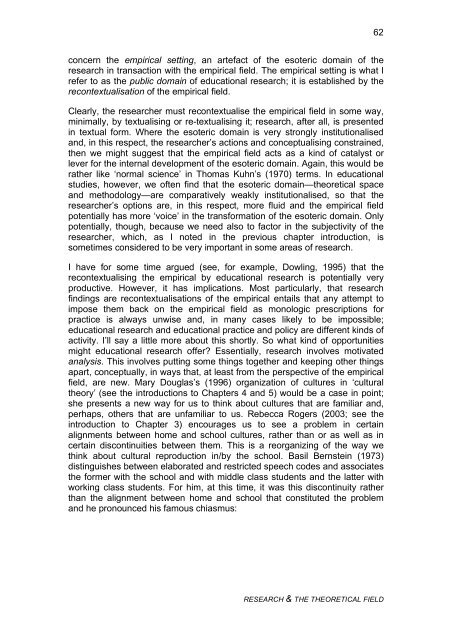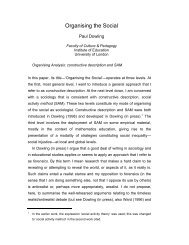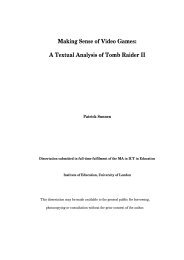Research and the Theoretical Field - Pauldowling.me
Research and the Theoretical Field - Pauldowling.me
Research and the Theoretical Field - Pauldowling.me
You also want an ePaper? Increase the reach of your titles
YUMPU automatically turns print PDFs into web optimized ePapers that Google loves.
62<br />
concern <strong>the</strong> empirical setting, an artefact of <strong>the</strong> esoteric domain of <strong>the</strong><br />
research in transaction with <strong>the</strong> empirical field. The empirical setting is what I<br />
refer to as <strong>the</strong> public domain of educational research; it is established by <strong>the</strong><br />
recontextualisation of <strong>the</strong> empirical field.<br />
Clearly, <strong>the</strong> researcher must recontextualise <strong>the</strong> empirical field in so<strong>me</strong> way,<br />
minimally, by textualising or re-textualising it; research, after all, is presented<br />
in textual form. Where <strong>the</strong> esoteric domain is very strongly institutionalised<br />
<strong>and</strong>, in this respect, <strong>the</strong> researcher’s actions <strong>and</strong> conceptualising constrained,<br />
<strong>the</strong>n we might suggest that <strong>the</strong> empirical field acts as a kind of catalyst or<br />
lever for <strong>the</strong> internal develop<strong>me</strong>nt of <strong>the</strong> esoteric domain. Again, this would be<br />
ra<strong>the</strong>r like ‘normal science’ in Thomas Kuhn’s (1970) terms. In educational<br />
studies, however, we often find that <strong>the</strong> esoteric domain—<strong>the</strong>oretical space<br />
<strong>and</strong> <strong>me</strong>thodology—are comparatively weakly institutionalised, so that <strong>the</strong><br />
researcher’s options are, in this respect, more fluid <strong>and</strong> <strong>the</strong> empirical field<br />
potentially has more ‘voice’ in <strong>the</strong> transformation of <strong>the</strong> esoteric domain. Only<br />
potentially, though, because we need also to factor in <strong>the</strong> subjectivity of <strong>the</strong><br />
researcher, which, as I noted in <strong>the</strong> previous chapter introduction, is<br />
so<strong>me</strong>ti<strong>me</strong>s considered to be very important in so<strong>me</strong> areas of research.<br />
I have for so<strong>me</strong> ti<strong>me</strong> argued (see, for example, Dowling, 1995) that <strong>the</strong><br />
recontextualising <strong>the</strong> empirical by educational research is potentially very<br />
productive. However, it has implications. Most particularly, that research<br />
findings are recontextualisations of <strong>the</strong> empirical entails that any attempt to<br />
impose <strong>the</strong>m back on <strong>the</strong> empirical field as monologic prescriptions for<br />
practice is always unwise <strong>and</strong>, in many cases likely to be impossible;<br />
educational research <strong>and</strong> educational practice <strong>and</strong> policy are different kinds of<br />
activity. I’ll say a little more about this shortly. So what kind of opportunities<br />
might educational research offer Essentially, research involves motivated<br />
analysis. This involves putting so<strong>me</strong> things toge<strong>the</strong>r <strong>and</strong> keeping o<strong>the</strong>r things<br />
apart, conceptually, in ways that, at least from <strong>the</strong> perspective of <strong>the</strong> empirical<br />
field, are new. Mary Douglas’s (1996) organization of cultures in ‘cultural<br />
<strong>the</strong>ory’ (see <strong>the</strong> introductions to Chapters 4 <strong>and</strong> 5) would be a case in point;<br />
she presents a new way for us to think about cultures that are familiar <strong>and</strong>,<br />
perhaps, o<strong>the</strong>rs that are unfamiliar to us. Rebecca Rogers (2003; see <strong>the</strong><br />
introduction to Chapter 3) encourages us to see a problem in certain<br />
align<strong>me</strong>nts between ho<strong>me</strong> <strong>and</strong> school cultures, ra<strong>the</strong>r than or as well as in<br />
certain discontinuities between <strong>the</strong>m. This is a reorganizing of <strong>the</strong> way we<br />
think about cultural reproduction in/by <strong>the</strong> school. Basil Bernstein (1973)<br />
distinguishes between elaborated <strong>and</strong> restricted speech codes <strong>and</strong> associates<br />
<strong>the</strong> for<strong>me</strong>r with <strong>the</strong> school <strong>and</strong> with middle class students <strong>and</strong> <strong>the</strong> latter with<br />
working class students. For him, at this ti<strong>me</strong>, it was this discontinuity ra<strong>the</strong>r<br />
than <strong>the</strong> align<strong>me</strong>nt between ho<strong>me</strong> <strong>and</strong> school that constituted <strong>the</strong> problem<br />
<strong>and</strong> he pronounced his famous chiasmus:<br />
RESEARCH & THE THEORETICAL FIELD




